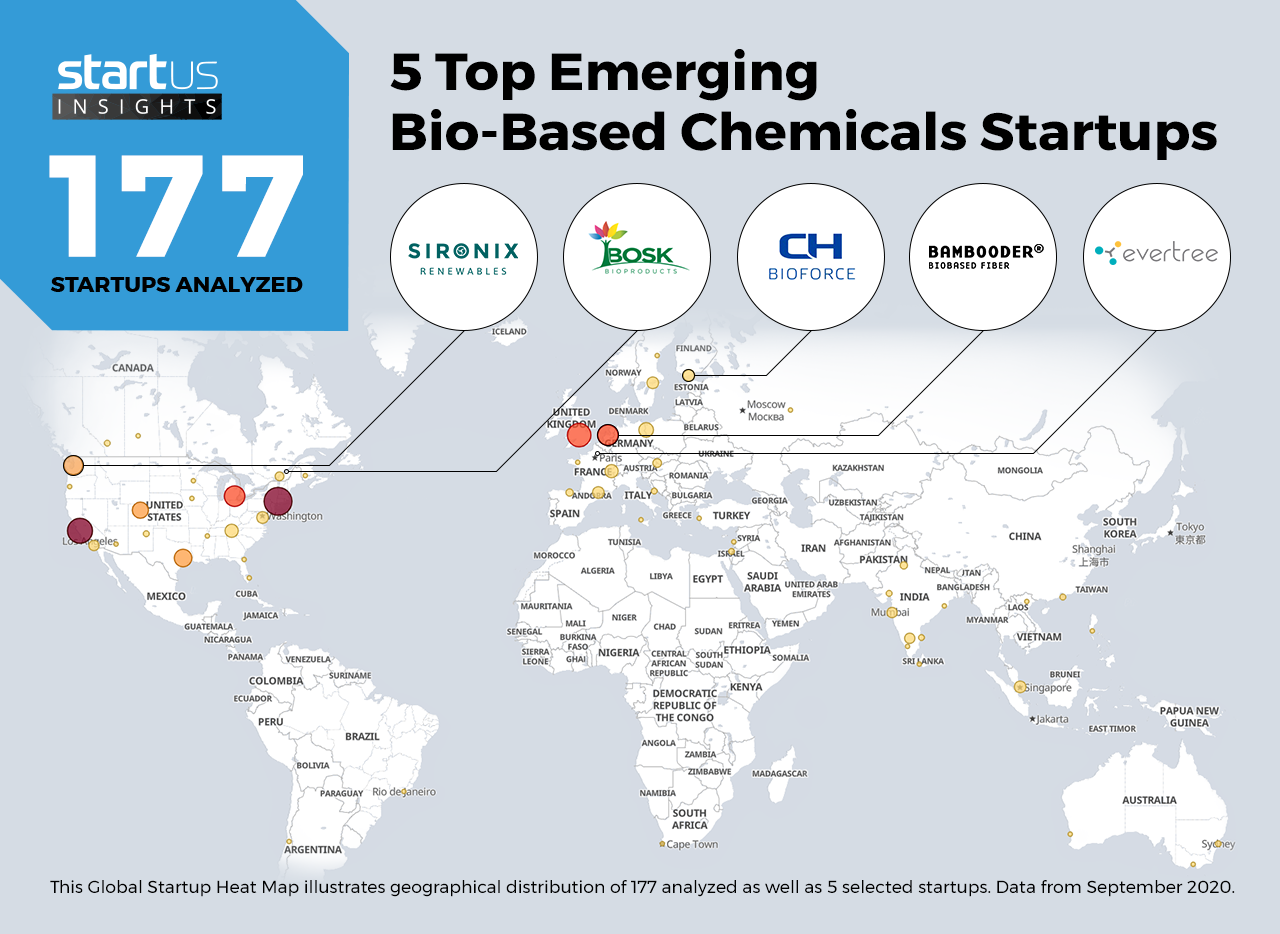Our Innovation Analysts recently looked into emerging technologies and up-and-coming startups working on solutions for the materials sector. As there is a large number of startups working on a wide variety of solutions, we decided to share our insights with you. This time, we are taking a look at 5 promising bio-based chemicals startups.
Heat Map: 5 Top Bio-Based Chemicals Startups
Using our StartUs Insights Discovery Platform, covering 1.379.000+ startups & scaleups, we looked at innovation in the field of materials. For this research, we identified 177 relevant solutions and picked 5 to showcase below. These companies are chosen based on a data-driven startup scouting approach, taking into account factors such as location, founding year, and relevance of technology, among others. Depending on your specific criteria, the top picks might look entirely different.
The Global Startup Heat Map below highlights 5 startups & scaleups developing innovative bio-based chemicals. Moreover, the Heat Map reveals regions that observe a high startup activity and illustrates the geographic distribution of all 177 companies we analyzed for this specific topic.
Evertree – Sustainable Industrial Chemicals
Many manufacturing processes involve petrochemical-based materials. This harms both the environment and worker health in plants and factories. Materials startups are working on bio-based alternatives that address this issue. These solutions generally utilize waste biomass and do not impact food or feed supplies.
Evertree is a French startup that develops sustainable alternatives to fossil fuel-based industrial chemicals. The startup’s technology identifies and isolates polypeptides and other key chemicals in renewable and abundant agricultural sources. SynerXiD is a family of proprietary dry powder chemicals that find applications in industrial manufacturing. The solution lowers the levels of volatile organic compounds (VOCs) and, as a result, improves health in manufacturing facilities.
Bambooder – Natural Fiber Composites
Synthetic fibers are major pollutants, most notably as microparticles in the oceans. In response, startups are developing natural fiber composites for use as alternatives to synthetic fibers. However, natural fiber solutions must also be economically viable to advance their widespread adoption. Moreover, these solutions must meet the strength and performance levels of synthetic fibers.
Dutch startup Bambooder produces natural fiber composites based on bamboo. The startup offers lightweight composites made of unidirectional bamboo fibers. The long bamboo fiber composites are available in the thread, fabric, and net structural forms. The specific mechanical properties of Bambooder’s materials match those of traditional counterparts, as well as glass fiber composites.
CH-Bioforce – Biomass Constituents
Biomass constituents act as a sustainable and underutilized source of fuel and other important chemicals. Besides, the production of biomass-based chemicals also addresses the problem of agricultural waste. Nowadays materials and chemical companies are working on technologies that improve the efficiency of extraction of chemicals from heterogeneous biomass sources.
CH-Bioforce is a Finnish startup that develops biomass fractionation technology. The startup’s process uses pressurized hot water extraction (PHWE) to extract valuable bio-based chemicals from wood and straw. These include sulfur-free lignin, polymeric hemicelluloses, and cellulose-rich pulp. The biomaterials find applications in the food, cosmetics, textiles, and water treatment industries, among others.
Sironix Renewables – Plant-Based Surfactants
Cleaning products usually find applications in a range of industries, including manufacturing, agrochemicals, oil & gas, and food processing. However, the synthesis and usage of these products generally contribute to both water and air pollution. Startups are working on sustainable bio-based alternatives that do not produce polluting byproducts.
The US-based startup Sironix Renewables provides plant-based surfactants for applications in detergents, agriculture, and oil recovery. The startup’s process uses non-competitive plant sources, such as soy and algal oil, to synthesize surfactants without producing toxic byproducts. Manufacturers then use these surfactants to develop detergents that help reduce the environmental footprint of their operations.
Bosk Bioproducts – Bioplastics
Plastics are one of the most ubiquitous and persistent pollutants in our ecosystems and pose a major challenge to sustainability. Startups develop bioplastics from renewable biomass sources, many of which are also easily biodegradable. As the demand for more sustainable alternatives grows among customers, companies are also gradually shifting to bioplastics for their packaging and other needs.
Bosk Bioproducts is a Canadian startup that develops compostable bioplastics called REGEN, polyhydroxyalkanoates (PHA)-based resins. REGEN is compatible with existing manufacturing equipment and has comparable mechanical and physical properties as well. The resin finds applications in manufacturing processes including in injection molding, thermoforming, extrusion blow molding, and additive manufacturing.
What About The Other 172 Solutions?
While we believe data is key to creating insights it can be easy to be overwhelmed by it. Our ambition is to create a comprehensive overview and provide actionable innovation intelligence and enable you to achieve your goals faster. The 5 bio-based chemical startups showcased above are promising examples out of 177 we analyzed for this article. To identify the most relevant solutions based on your specific criteria, get in touch.










